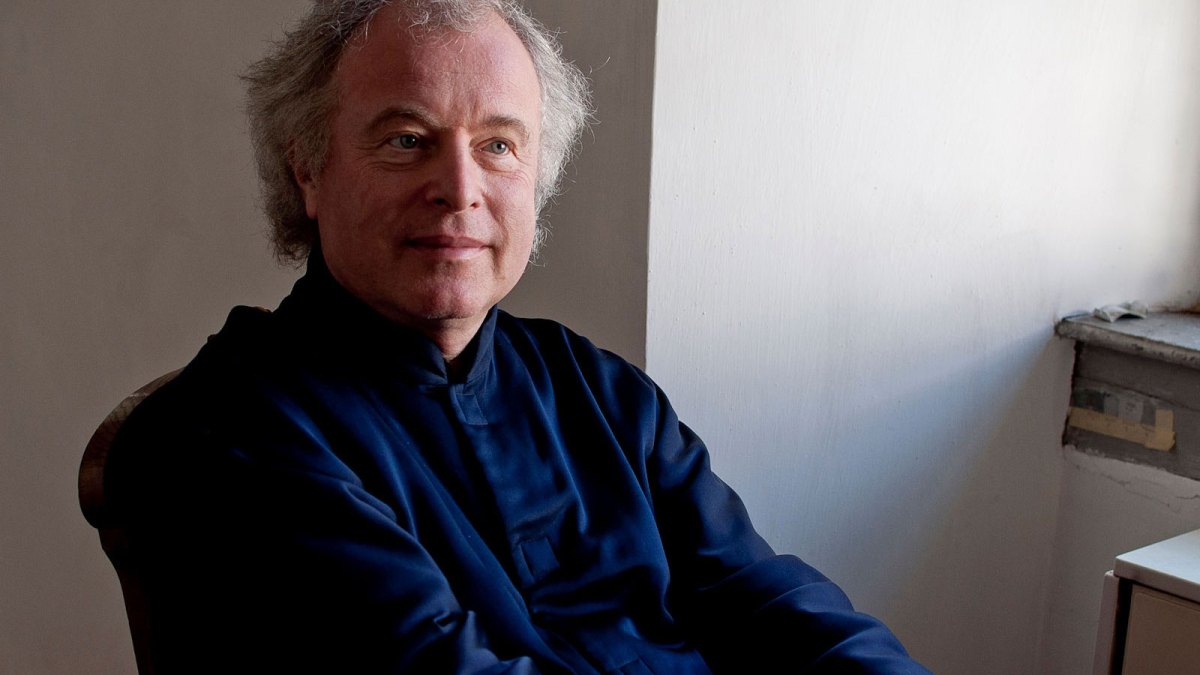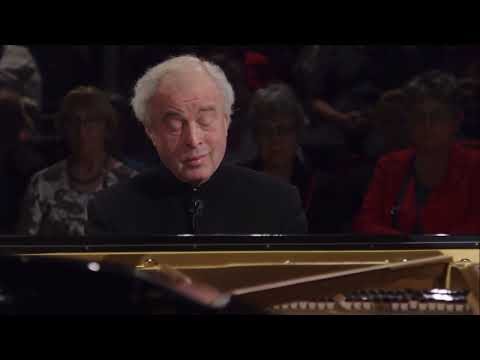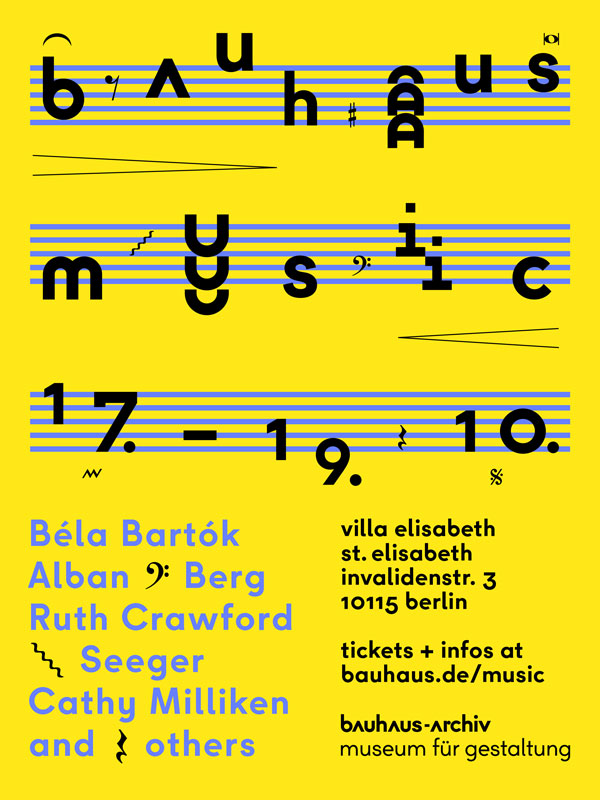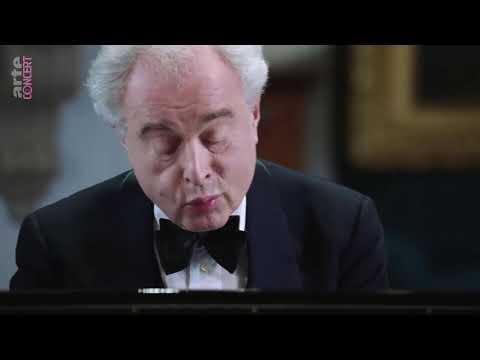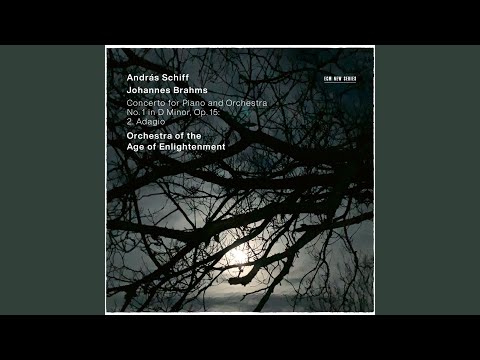Listening to classical music can occasionally give you the kind of blow on the head that the hero of Mark Twain’s novel A Connecticut Yankee in King Arthur’s Court receives: all of a sudden you’re in a different time and place. Thanks to our very own HIPsters, it’s possible to hear music just—or almost—as it sounded centuries ago. Say a 1828 Schubertiade in the Vienna salon of the Schober family; we time-travel to such an event and the aura of its music comes back to the future with us. Sometimes, we get stuck in a loop, caught in a place we’d rather be.
As a musical time traveler, pianist András Schiff feels so comfortable in Habsburg-Empire Vienna that the present frequently disgusts him. He rails against the “sonic monoculture” of the Steinway piano or the “Eurotrash” of avant-garde opera productions. He takes the interpretation of his core repertoire—Bach, the First Viennese School, Schubert, Brahms—so seriously that he responds to youthful arrogance as if it was a personal insult. Two years ago, I watched him give a masterclass at the Verbier Festival and tear apart a young Russian pianist, whose Bach Prelude was sloppy, with too much pedal: “You have no idea what you’re doing.”
Then again, you might call Schiff’s timeless crankiness modern. He was always more interested in widening his artistic horizons than in diving into pianistic minutiae. He never believed in the separation between art and politics, nor in stardom and the acrobatic virtuosity that fuels it. He introduces his recitals himself, putting the programs together the evening of the performance, depending on where he is and what he feels like playing. He was an early explorer of the diverse breed that makes up historical keyboard instruments—his latest Bach album was recorded on the clavichord.
I met Schiff one morning following a chamber music concert at the Salzburg Festival in the lounge of his hotel. The bar was still closed and an electrician was repairing the sound system, turning a chanson playlist up and down occasionally. Schiff’s presence is similar to his playing. He speaks softly, gently, and with an elegant thoroughness that forces you to listen. At the same time, his sentences are full of dry humor and cutting observations.
VAN: You’re known for your aversion toward competitions. In 1974, though, at the age of 20, you took part in the Tchaikovsky Competition in Moscow. How did that come about?
András Schiff: Even back then I was anything but the competition type, I’m still vehemently against them. We have to look for alternatives. But when I was young, in Communist Hungary, there were no alternatives. An official from the Ministry of Education called me and said, “Comrade Schiff, you’re going to Moscow.” There was no escape. It’s not like I could say, “I’d rather not, it’s not really my kind of repertoire.”
You played works by Liszt, Rachmaninoff, and Tchaikovsky there; repertoire you’ve otherwise tried hard to avoid.
Yeah, the Tchaikovsky Competition requires a different kind of program. I just had to go and do the best I could.
You’ve often described feeling like you weren’t ready for certain works when you were younger. Is there a “right” order in which students should learn pieces?
I think one should wait. Now, at 70, I’m going to play the “Art of Fugue” for the first time, after spending my whole life playing almost everything Bach ever wrote—every bar. These days, you get children playing the late Beethoven Sonatas or the “Goldberg” Variations. There are 14-year-olds who’ve never even played a two-voice invention, but who learn the “Art of Fugue” in a week… You can’t take it seriously. We wouldn’t go to a philosophy lecture held by an 8-year-old child, or a “King Lear” with a teen in the title role. But somehow it’s tolerated in music.
When you discuss Beethoven or Bach, you often use the image of the pinnacle. At what point does humility toward artistic pinnacles turn into paralysis?
I don’t think humility hurts. There’s a wide corridor between humility and arrogance, very wide. There are some Beethoven sonatas that a young person can play wonderfully. A young person can also play the notes of Op. 111, but the experience is missing. As a listener, I just don’t care what he has to say about it. You can start learning these works when you’re young, but you don’t have to record them right away, as some people do.
Are “right” and “wrong” categories you apply to interpretation?
For sure. There are objective criteria in which I believe strongly. The composer is more important than the interpreter, and a work has its laws—I believe that. The form, the structure, the harmonic language, the dynamics, the rhythms: These laws are the frame that the composer made, and which I must turn into sound as the interpreter. The frame is very flexible at times. Bach, for example, is generous, he doesn’t write a tempo, he doesn’t write dynamics, there are very few instructions in the score. As interpreters, we fill that in. The closer we come to the present, the less freedom we have.
Is that freedom something you especially value in Bach?
Yes, absolutely. The generosity, the spirituality, and the freedom. You can play a Bach fugue in so many different tempi and with so many different characters, and if it’s done well, it’ll be convincing. By the time you get to Mozart, that becomes impossible.
The latest from VAN, delivered straight to your inbox
Your core repertoire has been interpreted in many ways over the last 200 to 300 years. Do you think that the history of interpretation has started to become cyclical, with approaches repeating themselves, or is it still possible to find a truly new interpretation?
I strongly believe that there’s an evolution. The possibilities in a truly magnificent work are never exhausted. We also need magnificent new compositions. But when I ask myself what musical masterpieces have been composed since World War II, pieces that have proven themselves and become part of the repertoire, then I’m afraid it’s a rather short list.
Do you really think that’s because of the quality of the pieces?
It’s completely different in literature. It’s easy to come up with a long list of fantastic novels written in the last 80 years. The thing is, in literature, the language has stayed the same, while musical language changed radically with the introduction of the twelve-tone system.
But hadn’t musical language reached an end point where this change seemed necessary?
It was necessary, and I admire it, but when Schoenberg said that in a few decades shoemaker’s apprentices would be whistling his tunes on the street, he was way off. Who whistles his tone rows? Either a language has been lost, or a new language came that people don’t speak. I’m one of those people; I grew up with tonality, and in tonality you have orientation. In sonata form, you go from the tonic to the dominant, then the development, the recapitulation, “Ah, we’re back home.” Where’s the home in twelve-tone music?
Contemporary visual art stopped having an analogous “home” at some point too, but it’s still much more popular than new music.
You’re right about that. I’ve thought about it a lot. Why do people go to a contemporary art exhibit or to Art Basel in droves, but get so defensive when it comes to contemporary music? I think part of it is that visual art has a commercial aspect, money is very important in it, people buy modern art as an investment. I think this rejection of new music is unfair, you have to at least give it a chance—several chances, in fact—because if you hear a piece only once, it passes you by like a high-speed train.
Do you give it that chance?
I’ve played pieces by Heinz Holliger, Jörg Widmann, Elliott Carter, or György Kurtág. Kurtág taught me for ten years. I’m familiar with his language and I consider him one of the greatest living composers. But sometimes I have a guilty conscience, I worry it’s not enough. I really would like to play more new music, but there’s honestly not much that I really value, that speaks to me. I can’t play something just out of a sense of obligation. And I have to take care of my main repertoire. No one can do everything; we have our limits.
Other pianists play almost everything.
I don’t think that works. You have to be more self-critical. I’m aware of what I’m good at. I’m not good at Liszt and Rachmaninoff, and I don’t value their music either, although they’re fantastic composers for the piano. But there are enough people who do it well and love it. Why does everyone have to play Mozart? And how many people actually play Mozart well? Just because they have to, because they’re told to, because they don’t know any better? Same with Beethoven, Bach…
You’ve often expressed dismay at the “impoverished” present, saying that personalities like your teacher George Malcolm don’t exist these days, that everything has become short-lived, with an emphasis on entertainment value. Are you pessimistic about the future of culture?
I’m not a pessimist, but I do have a certain nostalgia for a specific time. I feel a little like the protagonist of [Stefan Zweig’s] The World of Yesterday. I wasn’t alive then, but my parents and grandparents were. I also feel it when I read Joseph Roth, Radetzky March. I can feel the atmosphere, I have a kind of indirect nostalgia. There were a lot of problems in the Hapsburg Empire, but still, this wonderful mix of cultures, from Bosnia, Croatia, Hungary, Bohemia, all this diversity, concentrated in Vienna…
You are planning not to perform in Hungary as long as Viktor Orbán remains in power. When Jörg Haider’s [far-right] FPÖ party entered the Austrian governing coalition, you also didn’t play there for a time. Recently, I discussed the ethics of performing in China with your friend Ádám Fischer. Would you also boycott, say, the German province of Thuringia, if the [increasingly powerful far-right] Alternative for Germany party won control of the local parliament there?
It’s a good question and an important one. If you want to be consistent, there are few places left where you can still perform. [In 2020], I told my American agent, “If Donald Trump gets re-elected, I’m not going to the U.S. anymore.” That didn’t happen, thank God, but it might now. I can’t accept such things: Donald Trump is a step too far. But we’re all just little dots. What we do and don’t do has no effect; it’s for your own conscience. But your conscience is an important thing.
Would you perform in Russia now?
I used to be in Russia very often. When I was asked where my favorite place to play was, I always answered automatically: “Russia.” The audiences there are like no others in the world. At the same time, it’s obvious that you can’t go to Russia now. I’m dumbstruck that some people don’t see it that way. Imagine saying in 1938 or 1940—many did say it—“I don’t like Hitler, but I’ll still play in Nazi Germany, because I love Beethoven, Schiller, and Goethe.” So I won’t say, “I have so many great friends in Russia, I love Tolstoy, Pushkin, and Tchaikovsky, and I’m going.” That would be an acceptance of the status quo. Someday this war will end, and there will be questions: “Why did you go to Russia then?” And then the answer will just be, “Oh, it wasn’t meant like that.” We’ve been through all this, after World War II.
Would you have performed with Furtwängler after World War II, as Yehudi Menuhin did?
With Furtwängler definitely, but not with Karajan. I hated him. Maybe he was a great conductor, but his music-making never touched me. And Böhm was even worse, he was a real Nazi. Furtwängler’s case was made into a big thing, but Böhm never had any problems. He kept on conducting right after the war. I don’t get it, I’d like someone to explain it to me.
In the last several years, you’ve been doing more and more conducting from the piano. How do you see yourself as a conductor? Do you have a role model?
I’ve never thought of myself as a conductor. I conduct because I’m interested; I’m fascinated by the works and I learn an incredible amount from it. Conducting has expanded my musical horizons, my piano playing has benefited from it.
In an older interview, you said, “I started with the Bach Concertos and the Mozart Concertos. Now it’s the Beethoven Concertos and the Schumann Concerto. But that’s the limit. I can’t conduct a Brahms Concerto.” You just recorded the Brahms Concertos, conducting the Orchestra of the Age of Enlightenment from the piano. How much further will your journey as a conductor take you?
That really is the limit. I once did Bartók’s Third Piano Concerto with the Chamber Orchestra of Europe. It was possible because the Chamber Orchestra of Europe is fantastic. Same with the Orchestra of the Age of Enlightenment. But these will remain exceptions.
How much have you suffered as a soloist under conductors?
It hasn’t only been suffering, I’ve also played with magnificent conductors, but these days… Hmm. It’s not a golden era. There are some great conductors: Ádám Fischer, his brother Iván, Simon Rattle, but not as many as there used to be. I’m scared by the tendency of having a kindergarten on the podium, especially in the U.S. We were just talking about humility. What is a 20-year-old conductor? Maybe he’s an extraordinary talent, but where’s the experience?
What about as a soloist with orchestras?
Orchestras are damn good these days. The level is extremely high. Unfortunately, the system is broken. You show up to an orchestra and the musicians sit there with the boredom written on their faces. I think, My God, you must have been a bright-eyed, enthusiastic music student. Where did it all go? They have rehearsals and look at the clock [and think], When will rehearsal finally be over? It can’t go on like this.
What do you think can be done about it?
The money isn’t the problem, many orchestra musicians make a good living. The thing is: When they were young, they were free and independent. Then they come into a community—especially as a string player—they play with a group, sacrificing a part of their individuality for the team. I’ve never done that, but I try to empathize with it. If I was an orchestra musician, I’d be put in two kinds of terrible spots: Either I’d have to play a piece I detest, like Carmina Burana, for me that’s the pinnacle of execrable music. But as an orchestra musician, you can’t say, “I won’t play this garbage.” You have to. Or, I’d have to play the “Jupiter” Symphony with a conductor who beats it to death, but it still has to work somehow. It’s not easy.
When you give recitals these days, you often don’t announce the program until the evening of the performance. Why?
It’s similar to the question about orchestras. I want more flexibility. Sometimes I announce the composers in advance, other times I don’t even do that. That gives me a lot of freedom. I have so many programs in my head and in my hands, but I can’t know if I’ll feel like playing a specific Mozart Sonata on a given evening in Vienna two years in advance. I need to go into the hall, try out the instrument, and then, say, realize that the “Tempest” Sonata sounds fantastic, while the “Waldstein” might be better elsewhere. Then I talk to the audience that evening and introduce the program. Not as a lecture—there are people in the audience who know the works better than I do, but also people who’ve never heard them before. You have to speak to both, to find a balance. I think this kind of spontaneity and surprise is a way of relaxing the stiff ritual of the concert. ¶
Subscribers keep VAN running!
VAN is proud to be an independent classical music magazine thanks to our subscribers. For just over 10 cents a day, you can enjoy unlimited access to over 875 articles in our archives—and get new ones delivered straight to your inbox each week.
Not ready to commit to a full year?
You can test-drive VAN for one month for the price of a coffee.

